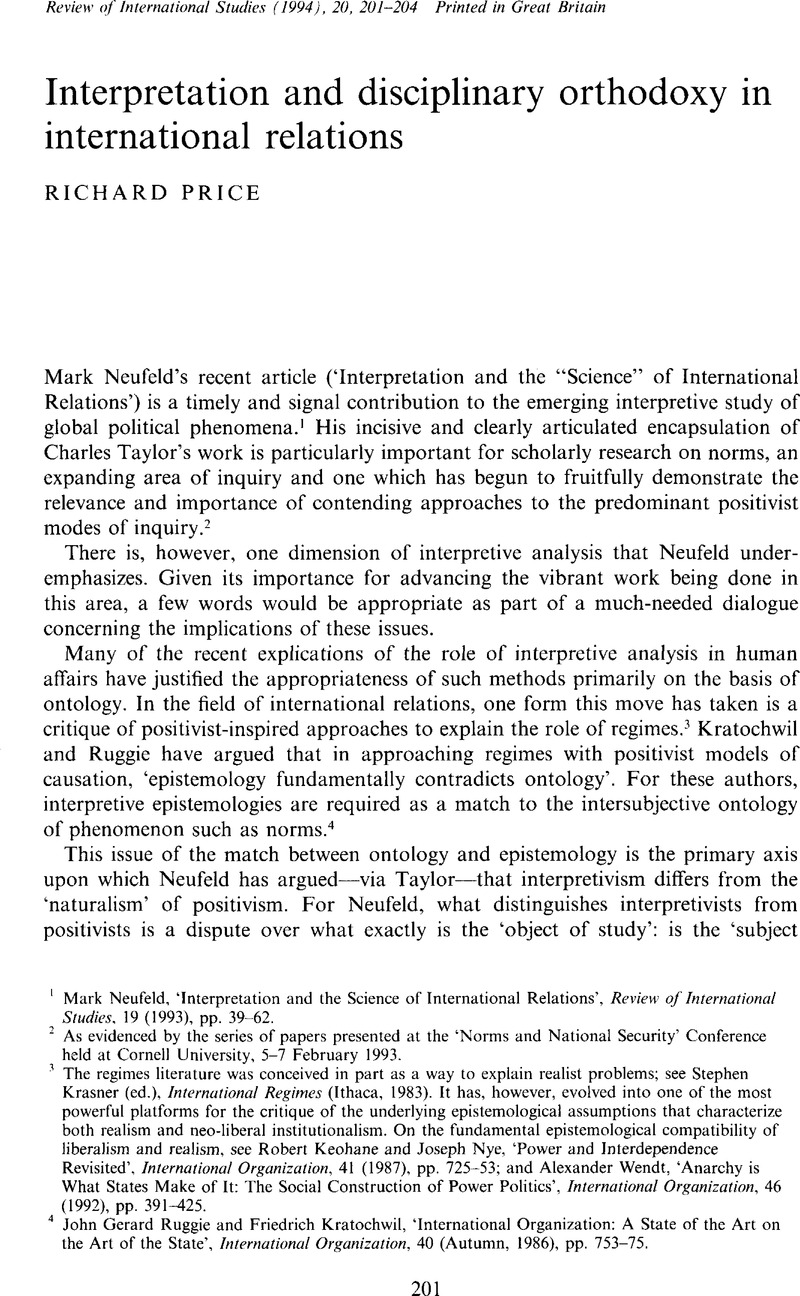Article contents
Interpretation and disciplinary orthodoxy in international relations
Published online by Cambridge University Press: 26 October 2009
Abstract

- Type
- Discussion
- Information
- Copyright
- Copyright © British International Studies Association 1994
References
1 Neufeld, Mark, ‘Interpretation and the Science of International Relations’, Review of International Studies, 19 (1993), pp. 39–62CrossRefGoogle Scholar.
2 As evidenced by the series of papers presented at the ‘Norms and National Security’ Conference held at Cornell University, 5–7 February 1993.
3 The regimes literature was conceived in part as a way to explain realist problems; see Krasner, Stephen (ed.), International Regimes (Ithaca, 1983)Google Scholar. It has, however, evolved into one of the most powerful platforms for the critique of the underlying epistemological assumptions that characterize both realism and neo-liberal institutionalism. On the fundamental epistemological compatibility of liberalism and realism, see Keohane, Robert and Nye, Joseph, ‘Power and Interdependence Revisited’, International Organization, 41 (1987), pp. 725–53Google Scholar; and Wendt, Alexander, ‘Anarchy is at States Make of It: The Social Construction of Power Polities’, International Organization, 46 (1992), pp. 391–425CrossRefGoogle Scholar.
4 Ruggie, John Gerard and Kratochwil, Friedrich, ‘International Organization: A State of the Art on the Art of the State’, International Organization, 40 (Autumn, 1986), pp. 753–75Google Scholar.
5 Neufeld, ‘Interpretation’, p. 49.
6 Neufeld, ‘Interpretation’, p. 53.
7 See Hoffmann, Stanley, ‘An American Social Science: International Relations’, Daedalus, 106 (1977), pp. 41–60Google Scholar; and Smith, Steve, ‘Paradigm Dominance in International Relations: The Development of International Relations as a Social Science’, Millennium, 16, no. 2 (1988), pp. 89–206Google Scholar.
8 On different styles of interpretive analysis, see Hiley, David, Bohman, James, and Shusterman, Richard (eds.), The Interpretive Turn (Ithaca, 1991)Google Scholar; Rabinow, Paul and Sullivan, William (eds.), Interpretive Social Science: A Second Look (Berkeley, 1987)Google Scholar; and Dallmayr, Fred and McCarthy, Thomas (eds.), Understanding and Social Inquiry (London, 1977)Google Scholar.
9 Taylor, Charles, Sources of the Self (Cambridge, 1989), p. 202Google Scholar.
10 Taylor, Sources of the Self, p. 203.
11 Nietzsche, Friedrich, On the Genealogy of Morals (New York, 1989), III, p. 23Google Scholar.
12 Richard Price, ‘A Genealogy of the Chemical Weapons Taboo’, unpublished paper presented at American Political Science Association Annual Meeting in Washington, D.C., September 4, 1993.
13 Hollis, Martin and Smith, Steve, Explaining and Understanding International Relations (Oxford, 1990)Google Scholar.
14 Cross, Charles, ‘Explanation and the Theory of Questions’, Erkenntnis, 34 (1991), pp. 237–60CrossRefGoogle Scholar. I am grateful to Alexander Wendt for pushing my own thoughts more explicitly in this direction.
15 Taylor, Sources of the Self p. 203.
16 Cross, ‘Explanation’, p. 257.
17 Neufeld, ‘Interpretation’, p. 55.
18 As argued by Wendt, ‘Anarchy’, p. 423.
- 6
- Cited by


